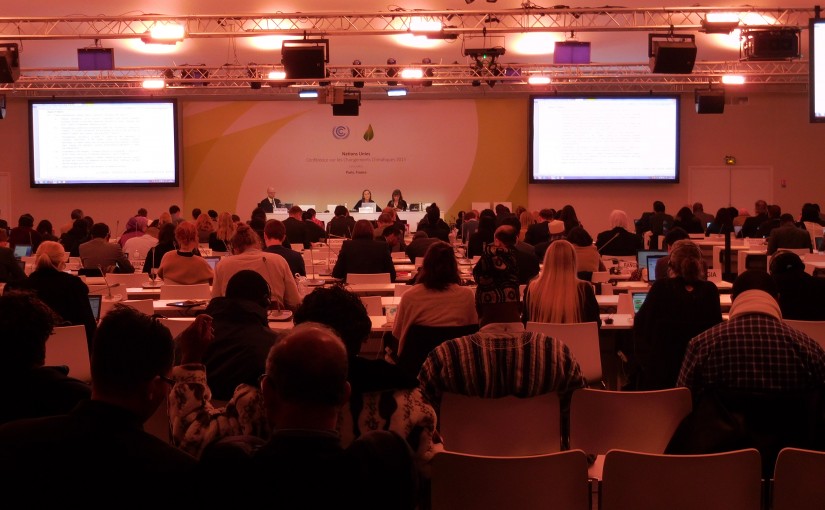It was the usual unease of trying to navigate where to set my tray down in a bustling cafeteria. Except the scenario was a bit different at the UN conference because I happened to sit across from a Ghanaian party representative.
I assumed that this man of high-level position would be disinterested in engaging with a student, but instead he immediately lit up when I sat down and we had a stimulating lunch discussion.
Mr. Ramses Cleland had just had a meeting with French President, Francois Hollande, and the other African nations about climate mitigation plans across the continent. Cleland particularly described to me his worries and the projects that related to West Africa.
Cleland focused on the shrinking of Lake Chad, an important fishing and water resource for the 5 countries that surround it. “When hope shrinks”, Cleland lamented, “it causes countries to despair.” He then detailed the climate-related migration of young people from the Lake Chad region who were no longer able to sustain a livelihood. Many residents thus take the journey across the Mediterranean to find work, are often rejected, and then sometimes even turn to terrorist groups for support. Climate change, he said, is linked to migration and terrorism. It makes people feel hopeless. With this example, Cleland explained to me how “the world is one” and that we must think of climate resiliency on a global scale.
Climate projects in Africa affect Europe and the vice versa. Mitigation now means less adaptation later. On a more hopeful note Cleland described initiatives to channel economic and environmental growth in the Lake Chad region instead of sending its inhabitants away. He talked about massive tree plantings via the Green Belt Movement to absorb increasing temperatures and to slow the desertification spreading southward from the Sahara.
I am excited to find out what passionate person I share a table with tomorrow at the COP.


I was just looking at a graphic showing the shrinking of Lake Chad:
http://www.unep.org/dewa/vitalwater/article116.html
Shocking. It’s amazing you were able to talk with the party delegate!
Wow thanks for providing those images. I didn’t realize it had shrunk that much! And yes, I’m lucky it worked out.
Wow, that is so cool that you got to interact with him. Lake Chad is still one of the water project areas we talk about in APES. I hadn’t thought about the connection implications for jobs, economy and terrorists. Do you think focusing on that part of the issue will help enable conversations or do you think it will hinder them?
Good to hear from you Mrs. Daye! And thanks for reading. I think providing the larger context is always good. That way hopefully we can engage economists, politicians, and other disciplines in engaging in collaborative solutions. Love to hear your thoughts too!
Indy,
The need to engage, communicate and motivate people from other disciplines is key to this whole issue. However, it is also the most difficult part of this as well. People do not always understand in a realistic manner the gravity and importance of many of these issues. Then you add the language barriers, both technical and heart language and the enormity of the issues starts to feel hopeless. However, the fact that this many people are gathered to focus on climate change in one place yearly does provide me some hope. I did not realize this conference even existed. I especially like the fact that there is a specific effort to involve young people. It is essential for individual people from different cultures and areas to meet in person as well because it is often easier to be gracious with other people and cultures if we know them. How do you think we can help these connections happen electronically and for the isolated cultures?
That must have been an amazing experience. We find it very unusual that Lake Chad is shrinking. We had no idea it was such an important fishing area to so many countries. Is there any way to reverse this issue?
Hi Noah and Derek. Thanks for your interest in the issue! I am not sure myself about ways to reduce the shrinking of Lake Chad besides reducing carbon emissions. I would have to do more research.
Hello! My group found it interesting that climate change has a direct effect on youth that feels disenfranchised and how it can encourage them to join militant groups and act out. It is especially relevant in light of the recent Syrian refugee crisis. What can governments do to help improve the social and economic environments these young people are in, so they don’t feel like joining these groups?
Thanks for sharing this Indiana. I’ve been invited to speak in Prof. Atshan’s Intro to Peace and Conflict Studies class today about “Greening Peace and Environmental Conflict.” I have excerpted a quote from your piece to share with the class. Let me also share this piece just out by a Swat alum, Kate Aronoff. https://www.jacobinmag.com/2015/11/cop-21-paris-climate-change-global-warming-keystone-pipeline/ Again, thanks!
Sorry, gotta share this quote from Kate Aronoff’s piece: “Echoing Klare, green groups organizing around COP21 have recently been framing the negotiations as an opportunity for peace. 350.org’s Nicolas Haeringer, for example, wrote in an email to that group’s list that climate change “fans the flames of conflict in many parts of the world — through drought, displacement, and other compounding factors,” calling COP21 “perhaps the most important peace summit that has ever been held.””
Are you seeing this merger of peace and climate mitigation discourse? If so, the Peace Collection at Swarthmore may need to prepare for new additions to its special collection on Peace and the Environment. http://www.swarthmore.edu/Library/peace/manuscriptcollections/Environment/environment.htm
Professor Smithey, thank you for your comments. I am honored that you quoted my post in the Peace and Conflict course. Thank you also for sharing Kate’s wise insights. It’s too bad I didn’t see her while I was there. Certainly in the opening ceremony world leaders such as Ban Ki Moon, the Prince of Whales, and Obama all talked about how climate change and conflict are linked. Francois Hollande said: “I am not choosing between the fight against climate and terrorism…in the name of climate justice we must act.” We also heard Al Gore speak later about how there are systemic and complex causes for the refugee crisis or for the war in Syria, but the affects of climate change surely contribute to the conflict. I hope this helps. I’d love to hear more about the special collection on Peace and the Environment!
My peers and I found it interesting that climate change can lead to migration and terrorism. We were wondering, how can climate change has a direct connection to people joining terrorist groups? Also are there any plans to recover Lake Chad, besides the “Tree Plantings”? If not could it completely disappear forever?
This must have been a once in a life time experience! How did you become so interested in this? Was it something that you wanted to do since you were young? Thanks for the blog posts, we appreciate it.
Thanks guys! I have helped support the Swarthmore delegates who have gone to the climate negotiations for the last 2 years. This is how I got interested in attending. I’ve been interested in the environment my whole life.
I thought the relationship the Ghanian representative made between the increasing despair of countries in a time of need to migration and terrorism was a very intriguing and thought provoking way of expressing the problem at hand. I can’t imagine being the one that sat right across from a person of this authority. To hear about it is one thing, but to hear it from a person that is experiencing the situation and having to represent hundreds of people is a completely different thing.
Melissa,
I agree that the in person meetings are amazing. If you could meet any of the delegates at this conference or any world leader; who would it be?